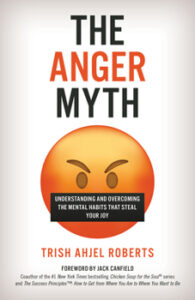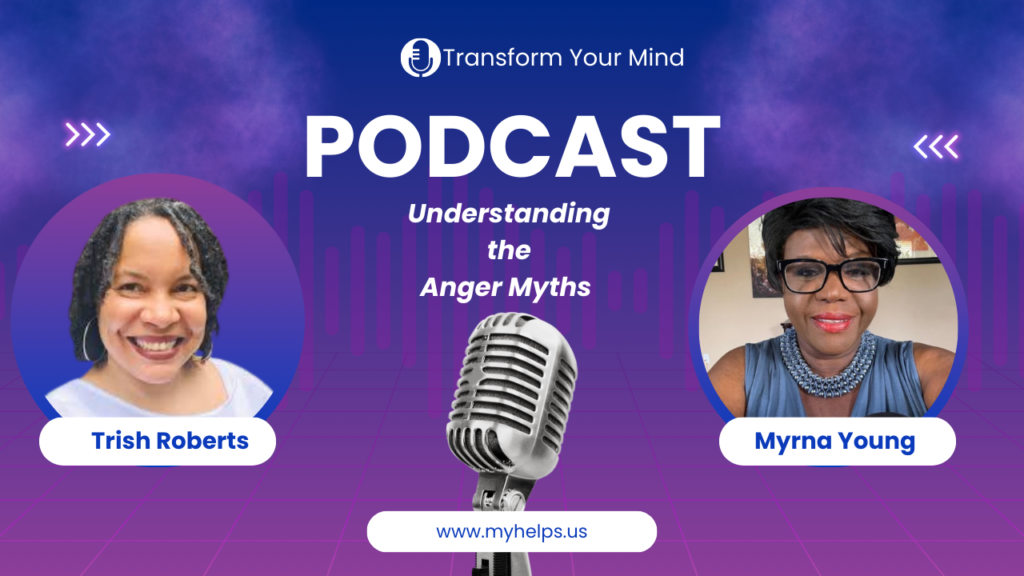Author and transformational coach Trish Ahjel Roberts discusses her book, “The Anger Myth,” with podcast host Myrna. They explore anger management, its impact on decisions, and how it disguises itself as emotions like jealousy and resentment. Trish introduces her five-step method to transform anger into constructive action, highlighting the importance of anger management, breathing, and empathy. She emphasizes the adverse health effects of anger and the benefits of spiritual practices. Tune in to learn how to redirect anger into positive, life-enhancing choices.
Download the Podcast Here:
Key Takeaways
Anger is a natural emotion, but it often masks deeper, underlying feelings and always provides false information, warranting careful interrogation.
Replace impulsive reactions with constructive action through Trish Roberts’ five-step “Tame and Reframe” method to manage anger through anger management practices effectively.
Understanding anger’s subtle manifestations can enhance personal well-being and relationships, fostering a more peaceful life.
Understanding Anger Management: Beyond the Surface
When we talk about anger management, it’s not just about visible outbursts or fiery confrontations. As unpacked by Trish Roberts during an engaging podcast discussion, anger is an emotion that we must confront and understand. Roberts, a transformational coach and happiness expert, introduces her book, “The Anger Myth,” offering crucial insights into recognizing and managing anger. As she explains, “Anger is never useful and always relays false information.” The distinction is significant—while feeling anger is natural, allowing it to dictate our actions often leads us astray. It’s like being intoxicated, where our judgment is clouded, and our decisions are likely flawed.
In essence, understanding anger involves acknowledging it without being consumed by it. As described in the podcast, Trish’s method entails recognizing when anger surfaces and putting space between us and the immediate impulse to react. She suggests that we “gear up your imagination,” developing empathy and compassion not only towards others but also towards ourselves. Such introspection allows us to distill the true emotions—like hurt or disrespect—that masquerade as anger, thereby guiding us to more rational decision-making.
The Seven Cranky Cousins of Anger
Moreover, Roberts introduces a unique perspective by identifying subtler forms of anger, which she terms as its “seven cranky cousins”: disappointment, annoyance, frustration, jealousy, impatience, guilt, and resentment. These emotions subtly permeate our daily interactions, often masquerading as benign irritants, yet contributing significantly to a broader, underlying anger. Roberts explains, “A lot of us walk around saying, well, I’m not angry, I’m just mad all the time.” However, these lesser emotions radiate the same negative energy, affecting our well-being and relationships.
Understanding these “cousins” helps us preempt anger by addressing its roots before it escalates. For instance, impatience is anger manifesting when we have to wait, and jealousy arises when someone possesses something we desire. By realizing these connections, we gain insight into not only avoiding negative expressions of anger but also fostering a healthier mental state. This comprehension is transformative, leading to greater personal satisfaction and stability within our relationships, ultimately reinforcing that acknowledging these emotions is pivotal.

Taming Anger: The Five-Step Method
Taming anger calls for a systematic approach, one that Roberts extensively details in her book using her comprehensive five-step “Tame and Reframe” method:
Acknowledge Your Anger: The journey begins with recognition. Admit and identify the feelings of anger as they arise.
Notice Your Breath: Before reacting, breathe. This pause creates essential space between the emotion and action.
Gear Up Your Imagination: Exercise empathy and look beyond your immediate reaction. This involves understanding others’ perspectives, thus defusing potential conflicts.
Entertain, Educate, Enlighten: Channel your focus toward constructive responses—distract yourself from minor irritations through entertainment, seek understanding, or find peace in spiritual practices.
Recognize Your Success: Celebrate small victories. Each step taken to successfully manage anger fosters more profound personal growth.
This structured approach promotes not merely temporary suppression but a genuine psychological shift, encouraging individuals to cultivate healthier, happier lives. Roberts emphasizes, “You don’t have to be angry to go from complacency to anger management,” redirecting the constructive force often mistakenly ascribed to anger into more healthful, productive channels.
Realizing the detrimental effects of poorly managed anger, both physically and mentally, urges us to adopt mindful practices in managing these emotions. Trish Roberts presents a fresh discourse on transforming anger, incorporating established philosophies with profound personal anecdotes, showcasing the pivotal transformation possible through understanding and healing our emotions. Her insights encourage us to reclaim joy by navigating the emotional landscape with greater awareness and intentionality. Such enlightenment is not merely personal but expansive, influencing the broader context of our interactions and relationships. As we align more closely with compassion and self-awareness, we forge a path to a more harmonious and fulfilled existence.









